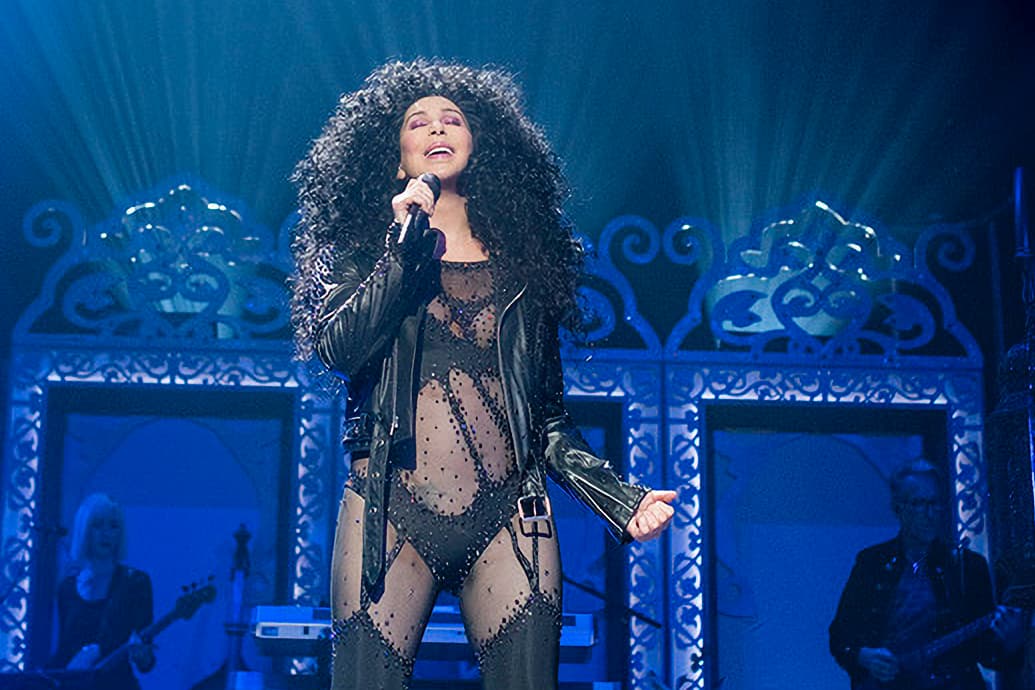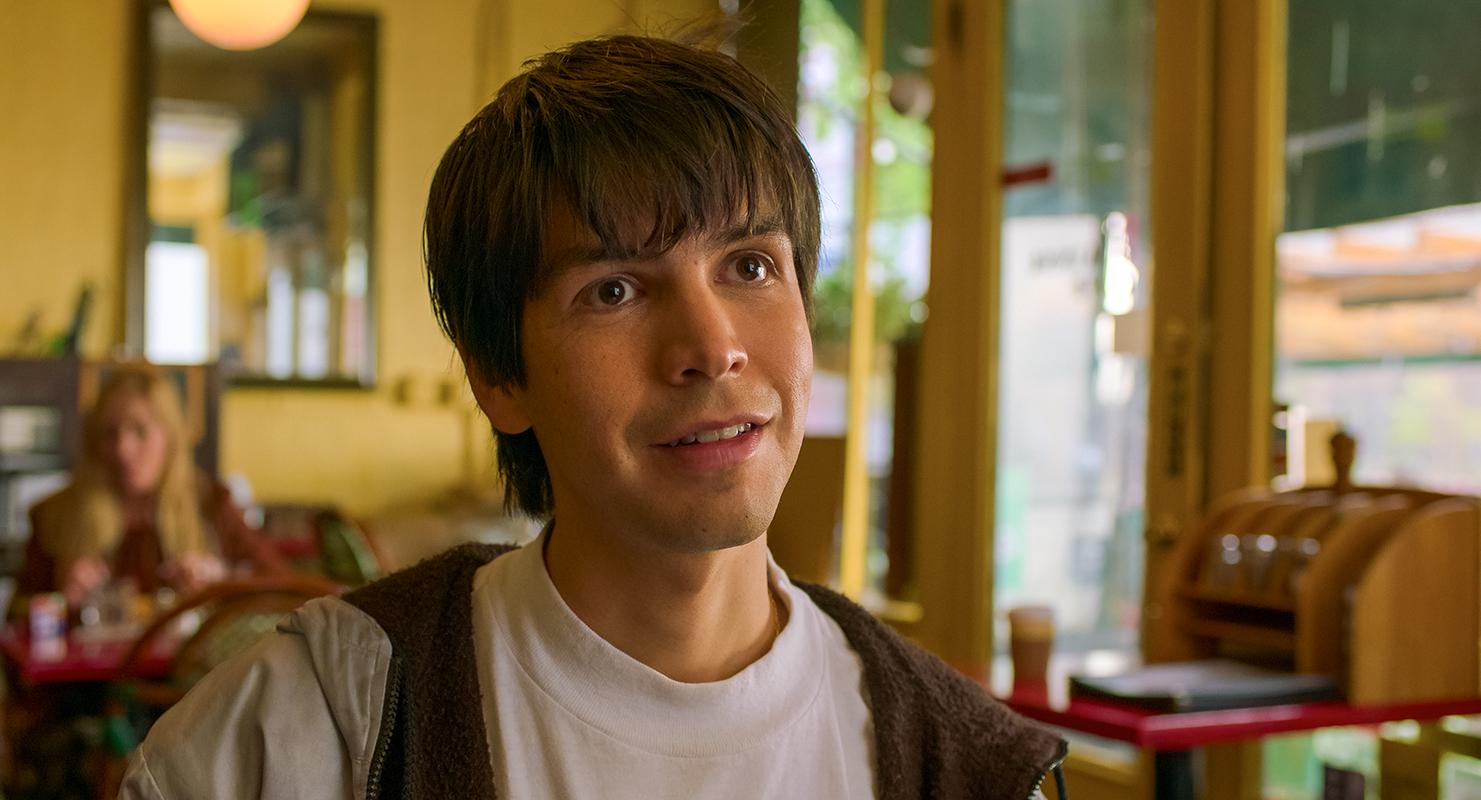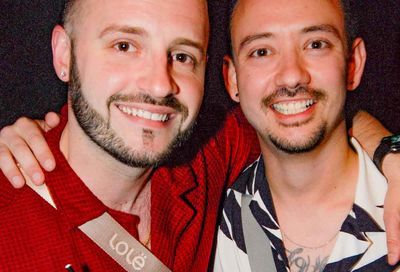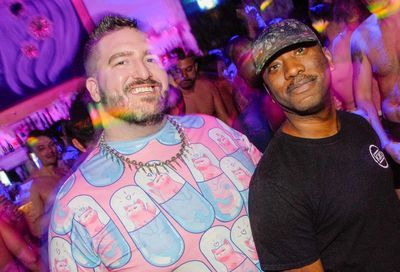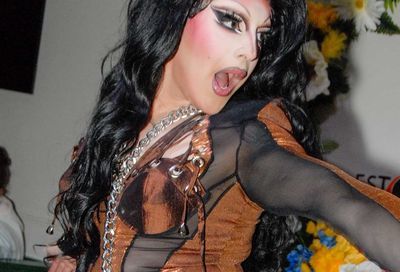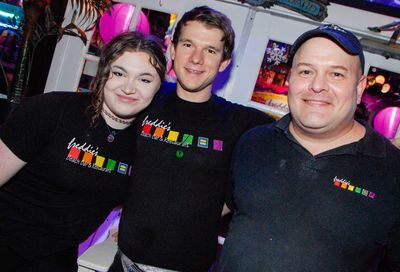Melissa Etheridge: The Metro Weekly Interview
Melissa Etheridge's refusal to compromise her artistry has allowed her to remain true to herself

The hair, freshly washed and still wet, lies flat.
In little over an hour, that hair will gradually transform — blossom, really, like a secret garden — into the flyaway, dirty blonde mane that frames the face of Melissa Etheridge.
It’s a Saturday morning in October, the day before HRC’s National Dinner, at which Etheridge is scheduled to present an award to her friend, director Steven Spielberg. Having recently finished a brief summer tour with her band, and before that, a critically-acclaimed solo tour, rock’s Sapphic goddess appears to be basking in a little down time. Her suite at the St. Regis is comfortable and quiet, save the occasional whirr of a hair dryer from the bedroom, where Etheridge’s girlfriend, actress Tammy Lynn Michaels, tends to her own curly, frosty platinum locks. It’s been nearly two years since the Etheridge and Michaels became a couple, and yet their love for one another seems fresh, playful, overwhelmingly joyous.
How will such an emotional high affect Etheridge’s music? After all, her last album, the critically-acclaimed Skin, chronicled her very public breakup with Julie Cypher (with whom she now shares custody of their two children, Bailey Jean, 5, and Beckett, 4). It’s a breathtakingly honest, emotionally raw piece of work.
“I have been at my best as a writer when I’m basically writing for my own therapy, my own catharsis, and when I don’t even think, ‘What are people going to want to hear?’ ” says Etheridge. “On seven albums, there’s been a lot of grappling with the dark side of emotional experience. So now I have this amazing relationship. I am in this wonderful place. Is my career over?
“I’ve been writing and recording some new songs, ” she continues, “and I am so excited because they come from this fresh powerful place that I’ve never before tapped into. I know I’m a very good songwriter when I’m in pain. I’d like to think that I can be a good songwriter when I’m not in pain. “
Clearly, not being in emotional pain hasn’t hurt Etheridge’s ability to perform. As evidence, witness her stunning solo tour, “Live…and Alone, ” now enshrined on a double DVD with all the trimmings — artist’s commentary, an illuminating interactive tour diary that, among other things, measures Melissa’s intake of water and her crew’s intake of bagels, and assorted bonus tracks. It even offers a rare glimpse of a brunette Etheridge performing in an extremely noisy bar in 1987. This was long before she was blonde, long before she was a star.
“When I used to play those bars, ” she recalls with a laugh, “the people would come and go. Or there’d be a loud pool game going on in the back, and I’d think, ‘Someday they’re going to come just to hear me play and listen to everything I do.’ ” For that reason, says Etheridge, “the solo tour was a dream come true. To have two thousand people there just to hear me, to hear my songs, who aren’t going to get up to play a game of pool, is pretty gratifying. “
A listen to any Etheridge-penned hit — the rousing “Come to My Window, ” the tender “Please Forgive Me, ” the charged and potent tribute to Matthew Shepard, “Scarecrow ” — leaves little room for doubt over Etheridge’s worthiness as a rock legend. But to see her live — and the DVD’s digitally filmed concert is as good a front-row seat as one can get — is to understand her real power as an artist.
Of the four prominent showbiz lesbians who have come out in the past decade — k.d. lang, Ellen DeGeneres, and Rosie O’Donnell — Etheridge’s career remains the only one soundly on track. Part of it is due to a straight fan base that doesn’t much care who she sleeps with. Part of it is due to a lesbian fan base that goes absolutely crazy over who she sleeps with. And part of it is due to Etheridge’s staunch refusal to compromise her artistry and change her style of songwriting.
Melissa Etheridge is all about remaining true — to her fans, to her music, to herself.
METRO WEEKLY: You’ve done several concert tours, but never before filmed one for the home video market. What made you choose the solo tour?
MELISSA ETHERIDGE: The first decision I made with my management after [releasing the album] Skin was that maybe it was time to do a solo tour. Skin was so introspective and such a stark emotional journey, that it seemed like the right time for it. Once that decision was made, my manager came to me and said “What do you think about filming it? ” I said “Sure, as long as it’s a real film of it, something that really captures the show.”
MW: Only one performance was filmed — the final night of the American leg of your tour at the Kodak Theatre in Los Angeles.
MELISSA: Yeah, just one performance. And I knew if I made mistakes, it was going to be [on film]. But I’ve always been in the moment of what’s happening on stage — it doesn’t have to be perfect. Mistakes happen, strings break, words get forgotten, but that’s what the show’s about — being right there with me, in the moment.
MW: Still, there must be a lot of extra pressure on that one night.
MELISSA: I don’t think I have to be perfect, I just think I have to be the best I can. I know it’s being filmed but I have to put that aside and just do my show for the audience, otherwise it’s not going to be a true show.
MW: I saw you here in Washington at the Warner, on the opening night of the “Live…and Alone ” tour. I was impressed at how well your songs carried over into a one-person format. I was also impressed by your relationship with the audience. The level of intimacy was quite astonishing.
MELISSA: It’s funny that you saw the first show because that’s where I first realized, “Oh, this is going to be an interactive show, I can talk to this audience. It’s what they want, not just song, song, song.”
MW: Were you surprised by how well you were able to manage that?
MELISSA: Well, I had come from that world. All the years that I had spent in bars and lounges and restaurants and Sunday brunches, all those experiences with audiences, with ten, fifteen people, were still there inside me. I was like, “I remember how to do this. “
MW: Rock music is traditionally regarded as a male-dominated field. What was it that made you pursue that particular musical road?
MELISSA: There was never a point at which I said, “Hmmm, I’ll go down this road.” It was the music I was making that led me down that road. I looked around and said, “Oh, this is the road I’m on.” Still, when I made my first record, we had a lot of trouble. When [the record reps] approached the radio stations, the [program directors] would say, “Sorry we already have a woman, we already have a Stevie Nicks song. We can’t add another woman.” But my record company, God bless ’em, stuck with it and broke down those barriers.
MW: So had it not been for the record company’s backing, your career might have taken a different turn.
MELISSA: Completely. I had three mildly successful albums, no big hit until my fourth record. That’s unheard of these days. Can you imagine a record company hanging in with an artist for three records and no hit? They’d cut them loose.
MW: Despite all the controversy surrounding the downloading of songs, I believe the Internet has been a boon for emerging artists.
MELISSA: I agree. I think that music lovers will always search out the good music. Listeners know what they like. And if they’re not hearing it on the pop radio stations, they’re going to look for it and find it, perhaps, on the Internet. So I am one of those artists who thinks that [the Internet] is healthy [for music]. It helps people build a career.
MW: What do you think about people who simply download your songs without purchasing the album?
MELISSA: I think they’ll come see me live. And in this day and age, I make most of my money by performing live.
MW: You came out in January, 1993, at President Clinton’s first inauguration. Clearly, an historic moment for you.
MELISSA: It’s funny these days how people reduce you to a sound byte. People magazine puts out a history of [modern day culture], and if you look up my name it says, “Came out at Clinton’s inauguration.” But I’d made no plans to come out that night. It was a slow evolution. It was three albums of being vague, of using non-gender specific words — my partner, my lover — and skipping around it, not feeling safe with it. I was asked to come play the inaugural. And I was also asked to come play the Gay and Lesbian Triangle Ball because I had friends in NGLTF. I was out with friends in the industry but I just hadn’t stepped out in public. And that night, there were a thousand queers all dressed up, and everyone was all very happy that we have this new president, and I said to the crowd, “Gee I’m very happy to be here and I’ve been a lesbian all my life! ” I didn’t know in advance that I was going to say that, didn’t even think about it. Immediately afterwards, my friends were all like, “Melissa, we think you just came out! ” And I go, “I guess I did. ” It got in the papers. Then the interviewers came and started to ask, “So, you’re a lesbian? “
MW: Was there a period of time where your sexuality was the only thing the media wanted to talk about with you?
MELISSA: Yes.
MW: Was that frustrating?
MELISSA: Not at all. Because I’d done three albums [prior to coming out], and they had sold about a million each. Suddenly, a lot of people wanted to talk to me. And I had a really good album with a song that was climbing [the charts]. I sold six million albums, it was massive. And I was talking my truth. It may have gotten a little boring after a while, but I never got frustrated with it.
MW: The media is often eager to tear celebrities apart, but you’ve pretty much escaped all that.
MELISSA: Because I’ve always kept my feet in the truth, I’ve never tried to paint my life as fabulous. Even when I went through my breakup with Julie, it was like, “Okay this is the truth and this is what happens. ” I never felt defensive. It was like, this is the information.
MW: You were very public about the births of your children Bailey Jean and Beckett. But you managed to keep the identity of the father, singer David Crosby, secret for quite some time.
MELISSA: Which at first I felt was the best thing to do. But all the media was like, “Who’s the father? Who’s the father? ” It got to the point where I was like, “Okay, my children are going to go to school soon, I don’t want them to have information that someone wants to have, so before they get old enough to have it affect them, I’m putting it out there. ” This is who it is, move onto the next thing.
MW: Are the children doing well?
MELISSA: They are. There has to be a bigger word than wonderful, fantastic, great. They’re just amazing.
MW: What did motherhood do for you?
MELISSA: It made me a better person. And it continues to make me want to be a better person. I found that once I had children, I obtained this huge compassion for the rest of the world. You want the world to be a better place. And I came to the understanding that parenting is the single most important job, occupation, choice, in the whole world.
MW: By the mere virtue of your celebrity, you’re often asked to go on the record regarding certain issues within the gay community. When Eminem created his initial swirl of controversy, for instance, you essentially supported him, citing his right to free speech. And for that you got chastised by GLAAD. How do you reconcile being on the side of an unpopular opinion in the gay realm?
MELISSA: Just because we’re all in the gay community doesn’t mean we’re all going to think alike. But the one thing we can all base it on is that each of us has our own truth. Eminem has his truth. Why would I ask him not to speak his truth when all I’m asking for myself is the right to speak my truth? I don’t have to like his truth, but he has the right. How can I be asking for tolerance and treat him with intolerance? It doesn’t work. People can have a different point of view. I will continue to speak my truth — it might be unpopular, it might be popular, but it’s my truth.
MW: Can you comment on Rosie O’Donnell, whose own truth has appeared to wreck her perfect career?
MELISSA: I’ve known Rosie for years — she’s got some demons, she’s got some things she’s got to work through, which she’s doing now — but you can’t take her experiences coming out as a lesbian and put it on the lesbian community. I remember Rosie, k.d., Ellen and myself, all hanging out in my backyard. We were just kind of starting to do our things and were like, “What would it be like if we came out? ” It was a huge blank in front of us. And then little by little, k.d. came out, I came out, then Ellen. But Rosie had the hugest success of all of us, getting that show together, the magazine. And when you open up and that big old spotlight shines on you, when you say “This is my personal life, ” and you can’t hide anything, the world comes in. And the world came in with a big light on Rosie. She was like, “You fell in love with this part of me and now I’m going to show you this side of me. Because this side is the truth. “
MW: Rosie recently said that she wouldn’t care if she lost all her money, that she was content in life. If things had soured for your when you came out, might you have felt the same way?
MELISSA: Success doesn’t make you happy. Being able to do what you love makes you happy. But if someone doesn’t like me for who I am, why would I want to be liked for who I’m not?
MW: What troubles you most in these post-9/11 days?
MELISSA: I don’t have enough time to go into it all. But I do think that when there’s troubled times, we’re on the edge of an amazing breakthrough. If I look at my own personal experience, I went through a very hard time, just the deepest depths before reaching a higher, better place. But sometimes you’ve got to go to the depths and see how ugly it can be. I think that’s where humankind is now. We’re down here. And I think in twenty years, maybe even ten years, we’ll look back and be amazed at just how far we’ve come.
The Melissa Etheridge Live…and Alone DVD is currently available in a deluxe two-disc set containing over two hours of music and bonus recordings ($29.99) and in a single disc set featuring 90 minutes of excerpts from the Kodak Theatre performance ($19.99).

Support Metro Weekly’s Journalism
These are challenging times for news organizations. And yet it’s crucial we stay active and provide vital resources and information to both our local readers and the world. So won’t you please take a moment and consider supporting Metro Weekly with a membership? For as little as $5 a month, you can help ensure Metro Weekly magazine and MetroWeekly.com remain free, viable resources as we provide the best, most diverse, culturally-resonant LGBTQ coverage in both the D.C. region and around the world. Memberships come with exclusive perks and discounts, your own personal digital delivery of each week’s magazine (and an archive), access to our Member's Lounge when it launches this fall, and exclusive members-only items like Metro Weekly Membership Mugs and Tote Bags! Check out all our membership levels here and please join us today!





